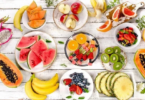Maintaining your skin health has more to it than just looking young and beautiful. Your skin is a barricade against any external complications such as ultraviolet (UV) radiation, bacterial infection and physical and chemical stress. Nutrition is one of the major contributors to maintaining healthy skin. What you eat reflects on your skin. No matter how many moisturizers you spend your money on, ‘you are what you eat’ stands truest because your skin’s maintenance starts with nourishment from within.
If you lack certain nutrients, their effects start showing on your skin sooner than you can imagine. Both macronutrients and micronutrients play a significant role in maintaining your skin’s health. Let us take a look at the 6 best nutrients that you should make sure to consume for your healthy skin.
1. Protein
Protein is one of the key building blocks of your skin tissue. By consuming protein-rich foods you are providing your skin with different types of protein – keratin, elastin and collagen. Each of these proteins takes care of your skin health. Keratin is a type of structural protein that helps in keeping your skin strong and firm. It further shields your skin from factors that cause skin degradation by providing hydration and rigidity and keeping your skin supple and beautiful.
Collagen and elastin work in collaboration to make your skin cells resilient. These two types of proteins are responsible for improving the elasticity of your skin and therefore making it smoother. Keratin, collagen and elastin are found in the dermis (middle layer) of your skin and work from the inside to reflect the result on the epidermis (the top layer that you can touch and see) of your skin. Some amino acids (building blocks of protein) are antioxidants that protect your skin from UV rays and free radical damage. You should add protein to your diet to provide strength, structural support and lustre.
Food sources: Chicken, lean meat, eggs, kidney beans, milk, cheese, and yogurt.
Daily requirement: The Recommended Daily Allowance (RDA) of protein is about 0.8 grams per kilogram of body weight. So, if you are someone who weighs 60 kg, you should ideally consume 48 grams (0.8 x 60) of protein per day.
2. Omega-3 Fatty Acids
Healthy fats help your skin glow. Omega-3 fatty acids help in preserving collagen in your skin and therefore contribute to keeping your skin firm. Omega-3 fatty acids provide protection against ultraviolet A (UVA) and ultraviolet B (UVB) rays. Omega-3 fatty acids are divided into three broad types – alpha-linolenic acid (ALA), docosahexaenoic acid (DHA), and eicosapentaenoic acid (EPA). Supplementation with a combination of DHA and EPA has effectively reduced the skin’s sensitivity to UV rays and also brought down the skin’s redness. Adding omega-3 fatty acids to your diet can also help prevent or reduce acne.
Your skin needs essential fatty acids like omega-3 fatty acids to act as a barrier to keep out the microbes and irritants. They further seal the moisture in your skin and fight redness, dryness and itchy skin. Omega-3 fatty acids are an absolute requirement for healthy skin. It keeps your skin thick, supple and moisturized.
Food sources: Salmon, mackerel, tuna, flaxseeds, chia seeds, walnuts, and soybean oil.
Daily requirement: There is no established upper limit but the National Institutes of Health recommends capping the intake of omega-3 fatty acids to 3 grams per day.
3. Vitamin A
A very important nutrient for your healthy skin is vitamin A. Vitamin A or retinol assists in collagen and elastin formation, leaving your skin looking firmer and radiant and minimizing any fine lines and wrinkles. Retinoid, a compound that is derived from vitamin A, fights signs of damage caused by UV rays such as hyperpigmentation and sunspots thus making your skin look youthful. Retinoids can further improve your skin tone by stimulating the production of new blood vessels. Vitamin A promotes wound healing, prevents breakouts and moisturises your skin. A deficiency of vitamin A can make your skin itchy and bumpy.
Food sources: Sweet potatoes, carrots, red bell peppers, mango, fish oil, and milk.
Daily requirement: The Recommended Daily Allowance (RDA) of vitamin A for adults 19 years and above is 900 and 700 micrograms for men and women respectively.
4. Vitamin C
If you are thinking of healthier skin, vitamin C is an absolute requirement. Vitamin C is a critical factor in the synthesis of collagen, thereby increasing the elasticity of the skin. This also makes vitamin C very effective in wound healing. The acidic nature of vitamin C helps with skin healing too. Vitamin C is also an antioxidant and is responsible for fighting against free radicals that damage your skin and cause early aging. Further, it lowers the risk of skin cancer with its antioxidant properties. Vitamin C has also been effective in preventing hyperpigmentation, preventing fine lines and wrinkles, providing hydration and protecting from sun exposure. It is a good idea to include vitamin C in your diet because a deficiency of this nutrient can lead to dry and flaky skin.
Food sources: Citrus fruits (lemons, grapefruit, oranges), tomatoes, peppers, kiwis, and strawberries.
Daily requirement: The Recommended Daily Allowance (RDA) of vitamin C for adults 19 years and above is 90 and 75 milligrams for men and women respectively.
5. Vitamin E
The antioxidant and anti-inflammatory properties of vitamin E are essential for your healthy skin. It works along with vitamin C in protecting your skin from sun exposure, strengthening the cell walls of your skin and preventing the formation of wrinkles. Being the anti-inflammatory agent for your skin, vitamin E reduces all kinds of skin inflammation such as discolouration and even UV-induced skin swelling. Inflammation is your body’s reaction to an injury or infection such as inflammation caused by acne. Vitamin E is very effective against these skin conditions. Vitamin E is also a competent antioxidant and helps prevent cell damage throughout your body. Vitamin E effectively locks the moisture in your skin and makes it supple. Overall, vitamin E treats dryness, wrinkles and sun damage and makes your skin smooth and radiant.
Food sources: Spinach, red bell peppers, pumpkin, peanuts, almond, sunflower oil, sunflower seeds, and safflower oil.
Daily requirement: The Recommended Daily Allowance (RDA) of vitamin E for adults is 15 milligrams.
6. Zinc
Zinc is a very significant nutrient for your healthy skin because it helps your skin heal after an injury. Like vitamin E, zinc also has anti-inflammatory properties. It helps reduce some of the irritation and redness caused by acne. Zinc is also effective against other inflammatory skin conditions such as eczema, rosacea and melasma. Zinc is also crucial for the transportation of vitamin A. Zinc further acts like an oxidant by protecting your skin against cell damage, keeping cell walls stable and helping cells to divide and grow.
Food sources: Oysters, red meat, poultry, crab, chickpeas, lentils, beans, whole grains, nuts, and dairy products.
Daily requirement: The Recommended Dietary Allowance (RDA) for adults is 11 and 8 milligrams a day for men and women respectively.
Final Takeaway
While you may find all the nutrients mentioned above in the various skin care products that you use, we recommend you also ensure that you add these essential nutrients to your diet for maintaining your skin’s health. Talk to your doctor to see if you are meeting your daily requirements of the 6 best nutrients for your healthy skin. If not, incorporate them and see the results for yourself.






